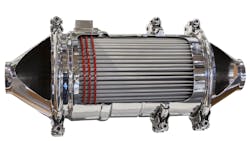NTEA supports U.S. senate catalytic converter anti-theft legislation
According to the National Insurance Crime Bureau, catalytic converter thefts rose by over 325% from 2019 to 2020. For this reason, NTEA–The Association for the Work Truck Industry gave their support for legislation to combat the rise in catalytic converter theft. The Preventing Auto Recycling Theft (PART) Act (Senate Bill 5024)—introduced by U.S. Senators Amy Klobuchar (D-MN) and Ron Wyden (D-OR)—is designed to help law enforcement more effectively trace stolen converters and address these thefts.
The U.S. Department of Justice reported that catalytic converters can be stolen in less than a minute and sold on the black market for over $1,000, and that their ease of theft is often attributed to their lack of VIN numbers or identifying features.
Among other provisions, the PART Act would help address the lack of infrastructure for returning these expensive components, which are valued for the palladium, platinum, and rhodium they often contain.
A companion bill (H.R. 6394) was introduced by U.S. Representative James Baird (R-IN) in the House of Representatives earlier this year, which codified the required inscription of catalytic converters with VIN numbers and provided grant funding for the Department of Transportation to do so.
“Theft of catalytic converters and other precious metals is widespread in our country and is costly to victims of such theft,” said Steve Carey, NTEA president & CEO. “This legislation is a step in the right direction in addressing this problem. NTEA applauds the efforts of Sen. Klobuchar and Sen. Wyden, as well as Rep. Baird, and encourages industry companies to support this important effort by contacting their legislators.”
NTEA joins the National Automobile Dealers Association (NADA) and the American Truck Dealers (ATD) in endorsing S. 5024.
In a press release, Sen. Klobuchar noted that catalytic converters are used to reduce the potency of toxic emissions from an internal combustion engine and required for vehicle compliance with the Clean Air Act. Replacing these parts imposes significant financial costs to vehicle owners and can even result in a total loss to the vehicle.
The PART Act would:
- Require new vehicles to have a vehicle identification number (VIN) stamped onto the converter to allow law enforcement officers to link stolen parts to the vehicle from which they originate
- Create a grant program through which entities can stamp VIN numbers onto catalytic converters of existing vehicles
- Improve recordkeeping standards for purchasers of used catalytic converters
- Establish enforceability of laws around catalytic converter theft by codifying these crimes as a criminal offense
For additional details, visit the NTEA's website section on the bill, which offers methods to contact senator and house representatives to discuss the legislation and links to the two sections of the PART Act.
